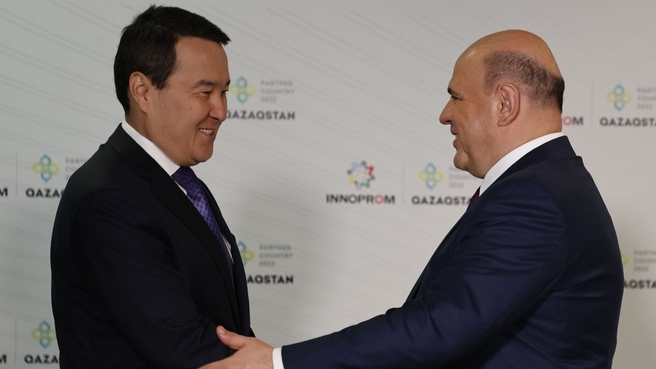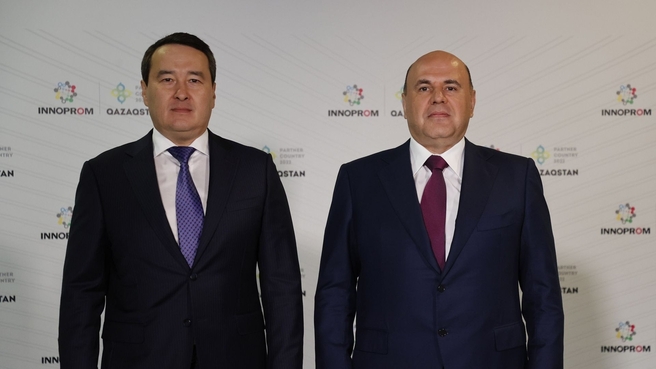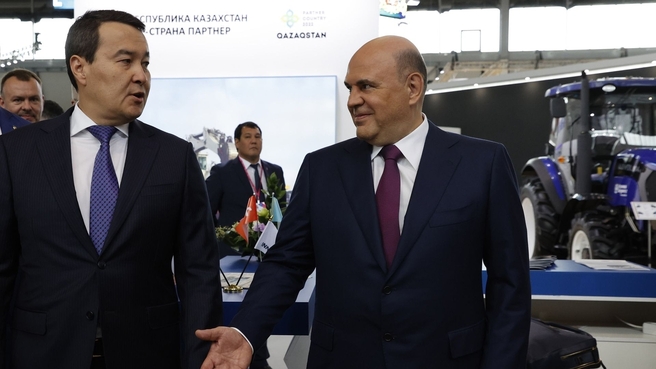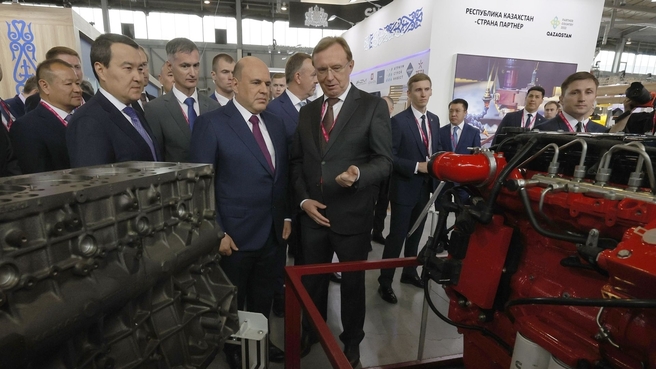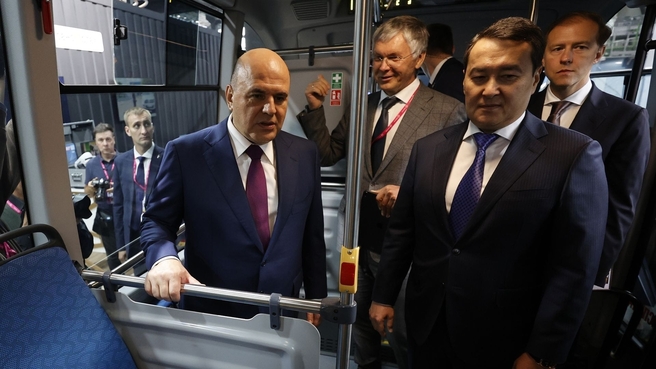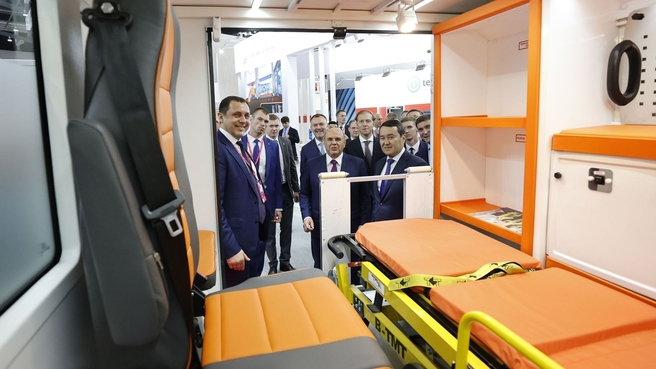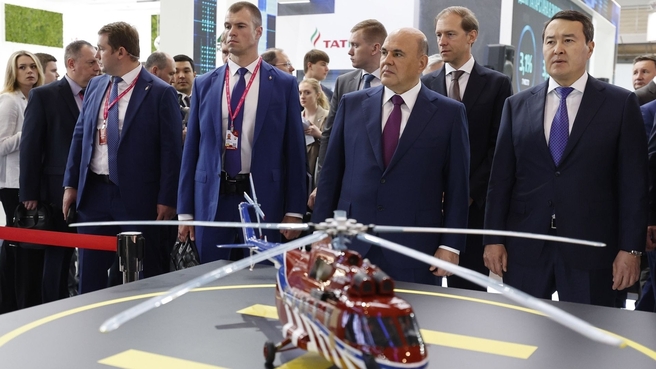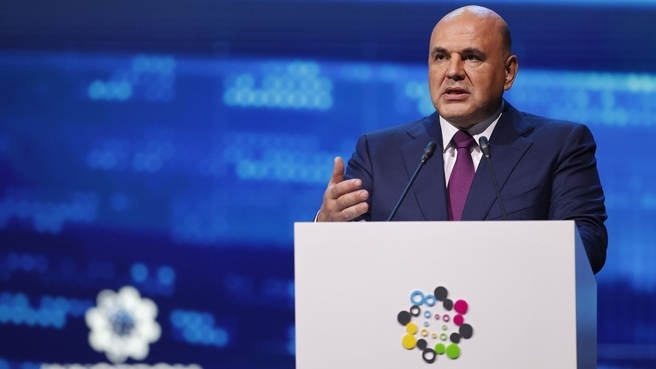The prime ministers of Russia and Kazakhstan delivered their speeches at the main strategic session of INNOPROM 2022 ‘Industrial Transition: The Experience of Leaders,’ and they toured the exhibition.

Mikhail Mishustin and Prime Minister of Kazakhstan Alikhan Smailov tour INNOPROM 2022. Looking over products from the company Maker. With Minister of Industry and Trade Denis Manturov and Maker Chairman (Karaganda Foundry and Machine-Building Plant) Zhanibek Baigabelov
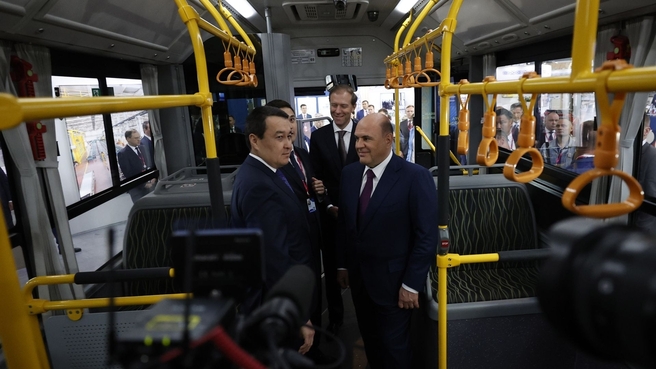
Mikhail Mishustin and Prime Minister of Kazakhstan Alikhan Smailov tour INNOPROM 2022. Reviewing the first prototype of the Sinara low-floor battery electric bus
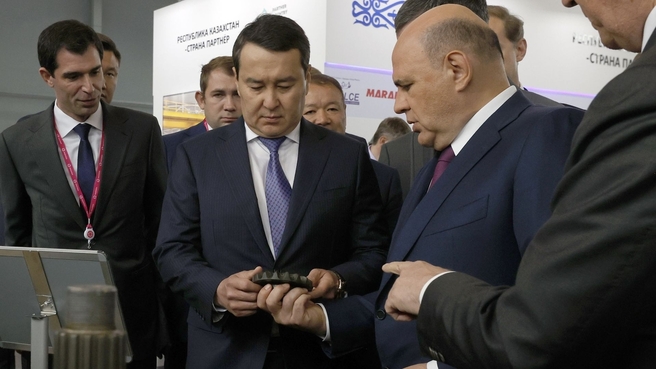
Mikhail Mishustin and Prime Minister of Kazakhstan Alikhan Smailov tour INNOPROM 2022. The Republic of Kazakhstan’s national exposition. A brief look at new cast beams, combustion heads, and cylinder cast-in-blocks by KamLitKZ. Sergei Kogogin, Director General of KAMAZ (right)
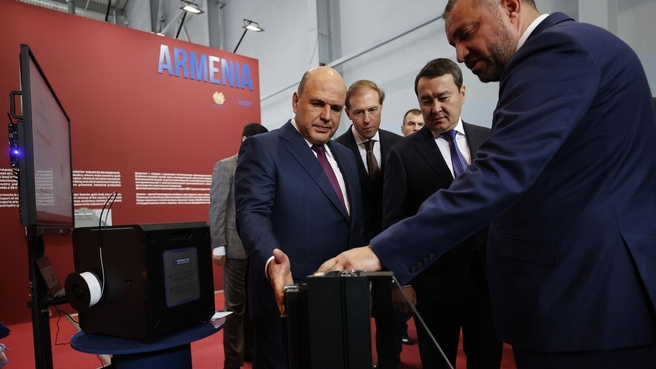
Mikhail Mishustin and Prime Minister of Kazakhstan Alikhan Smailov tour INNOPROM 2022. The Republic of Armenia’s national exposition stand. Armenian Minister of Economy Vahan Kerobyan (far right)
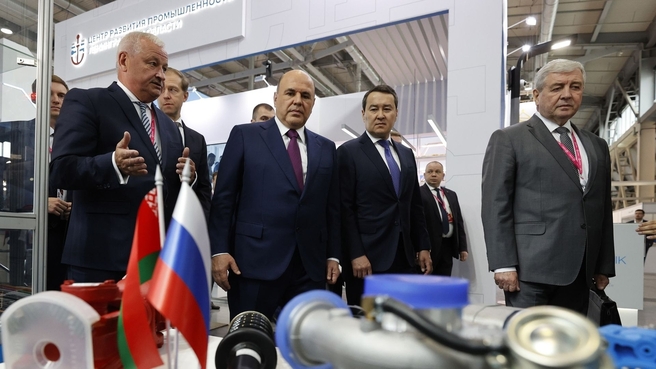
Mikhail Mishustin and Prime Minister of Kazakhstan Alikhan Smailov tour INNOPROM 2022. Examining the Republic of Belarus’ national exposition stand. Belarusian Minister of Industry Pyotr Parkhomchik (left)
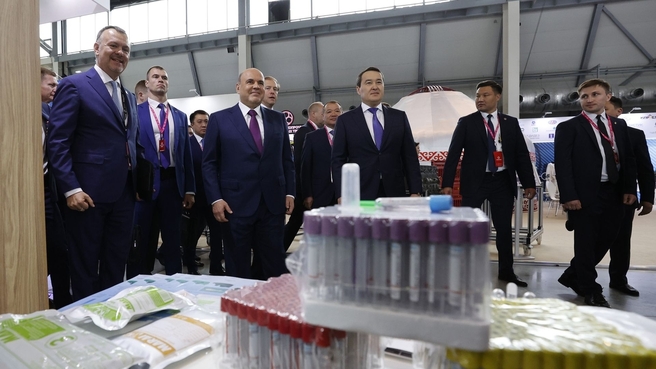
Mikhail Mishustin and Prime Minister of Kazakhstan Alikhan Smailov tour INNOPROM 2022. Reviewing EcoFarm International’s products at the Republic of Kazakhstan’s national stand
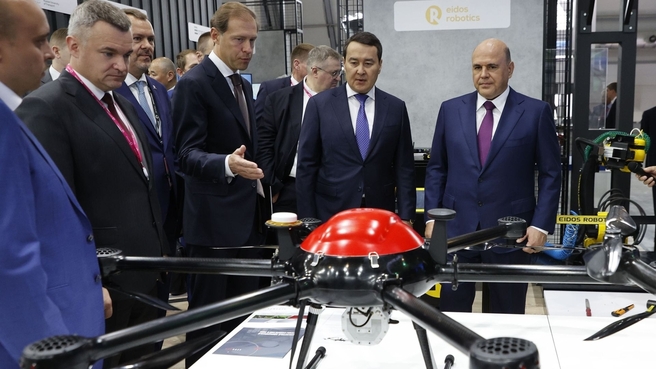
Mikhail Mishustin and Prime Minister of Kazakhstan Alikhan Smailov tour INNOPROM 2022. With Minister of Industry and Trade Denis Manturov. A Gemini quadcopter from the Geoscan Group
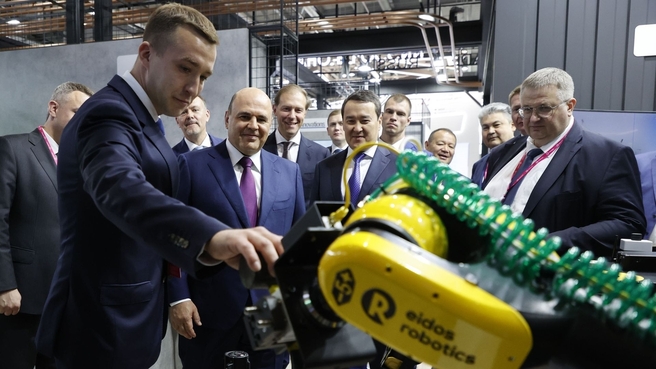
Mikhail Mishustin and Prime Minister of Kazakhstan Alikhan Smailov tour INNOPROM 2022. Looking at an A12 robotic arm from Eidos-Robotics. With Alexei Overchuk and Minister of Industry and Trade Denis Manturov. Director General of Eidos-Robotics Anton Suryaninov (far left)
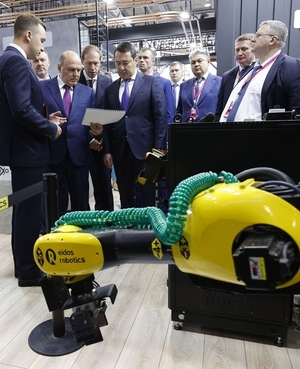
Mikhail Mishustin and Prime Minister of Kazakhstan Alikhan Smailov tour INNOPROM 2022. Looking at an A12 robotic arm from Eidos-Robotics. With Alexei Overchuk and Minister of Industry and Trade Denis Manturov. Director General of Eidos-Robotics Anton Suryaninov (far left)
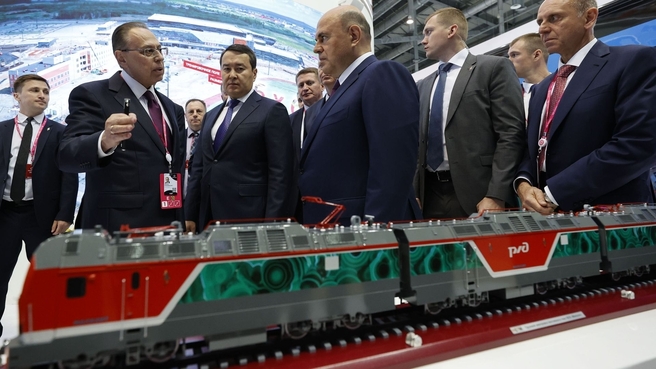
Mikhail Mishustin and Prime Minister of Kazakhstan Alikhan Smailov tour INNOPROM 2022. The Metallurgical Pipe Company and Sinara Group stand. A brief presentation of the Malachite electric locomotive. General Director of Sinara Group Mikhail Khodorovsky (left)
Mikhail Mishustin and Prime Minister of Kazakhstan Alikhan Smailov
Kazakhstani Prime Minister Alikhan Smailov’s remarks
INNOPROM is an international industrial exhibition held annually in Yekaterinburg since 2010.
The theme of the 12th International Industrial Fair INNOPROM 2022 is Industrial Transition: from Challenges to New Opportunities. If in 2021 the main challenge was the COVID-19 epidemic and the search for new opportunities for industrial development in the realities of the coronavirus restrictions, in 2022, it is the search for new supply chains and ensuring technological sovereignty. This year’s business programme is focused on the opportunities opening up in new markets.
The partner country for the 2022 exhibition is the Republic of Kazakhstan. In total, more than 600 international companies will take part in INNOPROM, and participants from 25 countries will come with official delegations.
Excerpts from the transcript:
Mikhail Mishustin: Good afternoon, ladies and gentlemen. Mr Alikhan Smailov, colleagues, our country’s guests.
I would like to welcome everyone to Russia’s main industrial event, the 12th International Industrial Trade Fair INNOPROM 2022.
This trade fair involves representatives of over 500 Russian and international companies, as well as business leaders from 30 countries. This is even more than last year.
We have many friends in the world. We appreciate and respect each of them. The fact that we have gathered at this event confirms once again that it is impossible to isolate Russia. We are inextricably linked with the world.
Kazakhstan is the current exhibition’s partner country. Our states maintain special relations of strategic partnership and alliance. I would like to welcome the delegation of the republic and Prime Minister Alikhan Smailov separately. I would like to thank them for sending such a large delegation to this INNOPROM event. This is yet another step towards deeper co-production arrangements and towards opening new joint production facilities. We have just finished touring the exhibition and the stands of Kazakhstan, Uzbekistan, Armenia and Belarus. Our countries find it important to enhance macroeconomic stability in Eurasia, to implement joint projects, to reduce their dependence on foreign imports and to expand cooperation in the manufacturing domestic goods. We have gained much successful experience in this field.
We have also seen innovation from enterprises in the Sverdlovsk Region, as well as the Russian Export Centre, the Rostec and Rosatom corporations, the Almaz-Antey Concern and many other companies, at the exhibition. The region is hosting the exhibition with hospitality today.
We were, on the whole, positively surprised to see so many promising projects in various spheres, including transport engineering, metallurgy, the energy sector and pharmaceutics. I would like to single out innovative solutions for developing digital production facilities. Not so long ago, we discussed the importance of this aspect at the Digital Industry of Industrial Russia conference in Nizhny Novgorod in great detail. We need this foundation for making Russian enterprises and their goods more competitive.
This year’s INNOPROM event is focused on industrial conversion. Hopefully, experts, businesspersons and representatives of state agencies will jointly draft proposals that will help Russian industry overcome the current challenges more effectively, during the upcoming discussions.
Sanction barriers and bans have drastically altered the current state of things. From now on, not a single country can guarantee imports of important foreign-made goods. So, we will have to create technological sovereignty as soon as possible.
We will have to create new principles and new approaches for continuing the industrialisation of the country and expediting the development of high-tech and science-intensive production facilities.
Ever since the first industrial revolution, all economic sectors have relied on a strong manufacturing industry to grow. However, this is no longer enough under these new circumstances. You need to have your own competencies, resources and technologies.
This is not an easy job, but Russia can deal with it.
Most importantly, we have achievements we can build on which largely allowed our industry to withstand the impact and avoid dramatic scenarios that our opponents predicted and anticipated. Yes, there’s a certain decline in certain sectors, but we have not reached a critical point in any of them. On the contrary, the growth rates in electronics, pharmaceuticals, and many other industries have increased.
The other day, we visited the Vladimir Region and toured several enterprises. They are doing quite well and enjoy high levels of localisation. They are using in-house technologies as well. The number of orders is on the rise.
Overall, Russian industry has shown its resilience and confirmed its ability to quickly adapt to new challenges. In five months, the volume of industrial production has grown by almost 3 percent, annualised.
The economy remains in the black. According to the Ministry of Economic Development, GDP grew by about 0.5 percent in January-May.
Swift supportive actions by the state were an important factor in stabilising the situation. Most importantly, the Government allocated 120 billion roubles to provide major enterprises with cheap borrowed resources.
A sum of 50 billion roubles was allocated to provide additional capital to the Industrial Development Fund. We also supported parts and component developers by launching a reverse engineering mechanism by allocating over 2 billion roubles this year towards for this.
Many effective measures have been implemented in the regulatory sphere. Thus, the temporarily issued exemptions for parallel imports allows our enterprises to quickly establish new supply chains for raw materials and parts and components that are not yet produced domestically.
We have also extended the incentive mechanism for investing in the industrial sector – SPIC 1.0 – and simplified the procedures under SPIC 2.0. Also, we postponed the deadlines for fulfilling obligations under state support, and moved the deadlines for paying the disposal fee to December for our automakers. A number of other measures have been taken as well.
At the same time, the sanctions prompted us to launch more active restructuring in key industries. We've been doing this for many years now. But now the tasks of developing our own production facilities and creating advanced competencies have become one of the state’s top priorities.
At the St Petersburg International Economic Forum, the President directed developers to expedite the development of critical and advanced technologies. This concerns all industrial sectors.
In the aircraft industry, we are doing our best to expedite the supply of Russian flagship airliners with fully domestic components and are starting to actively expand the product line. Each project has been assigned a deadline that will be strictly observed. All of them were included in the comprehensive programme for the development of the air transport industry to 2030 that was approved by the Government.
We rely on the same principles to overhaul the automotive industry. The main efforts focus on forming a local component base for domestic brands.
Russia does not see itself without a powerful ship fleet. We must have a strong shipbuilding industry. To do so, our shipyards will have to engage in deep localisation of production for all types of ships from nuclear-powered icebreakers, gas carriers, tankers and container ships to small river boats. The same goes for ship maintenance. I would like to note that we have a programme to develop our own diesel industry to equip the sea fleet and the river fleet with propulsion equipment. Once we have implemented this, we will meet our domestic needs for low- and high-speed engines.
The pandemic has highlighted how important it was to have a self-sustaining pharmaceutical industry. Now it is obvious to everyone that this is a strategic industry that can ensure the security of the country.
We have succeeded in producing vaccines and medicines. However, these successes are partly based on imported components, so we need to begin to create technological independence in biological and chemical substances, raw materials, and equipment immediately.
Low-tonnage chemistry is an essential segment here. The president has given all the necessary instructions to develop this sphere. Independent low-tonnage chemistry is needed not only for pharmaceuticals, but also for a wide range of industries from the food industry and household chemicals to mechanical engineering and building materials, including the development of radio electronics, which is the foundation for digitalising the economy, something that was discussed in detail in Nizhny Novgorod.
We have carefully approached reforms in the strategy for the development of the radio-electronic industry. I will highlight four main goals. The first is to increase production capacity in all segments. The second is to radically increase the presence in the domestic market from the current 12 percent to 70 percent by 2030. The next step is to increase domestic content in all economic sectors, step by step. And the fourth goal is to develop domestic automated design tools, an electronic component base, equipment, and materials.
The Government is now carrying out this work within the four federal projects. In total, there are over 500 initiatives. We will track all fixed points quarterly. It is important not to miss the deadlines.
At the same time, we are planning to coordinate the efforts of industry, the scientific community and the IT industry to address problems in complex software products, such as full life cycle systems, computer-aided design, and engineering analysis. Industrial competence centres are now being created to replace foreign digital products and solutions, as well as to develop Russian software.
Colleagues,
This is just part of the work to be carried out in the framework of industrial transition. Our equipment manufacturing, energy engineering and almost every sector are facing serious challenges. The goal is the same for all of them – to move from a pattern of catch-up to a model of driving development. This is the only way we can restore our domestic market and intensively build up high-tech exports.
To reach this goal we need new, system-wide support tools, including serious impetuses for developing industrial infrastructure and sectoral cooperation. We are already drafting plans for this.
Following the President’s instructions, the Government will soon present an upgraded model for industrial clusters. Resident companies that plan to develop the production of goods from the critical imports list will receive more benefits, such as access to long-term funding, which is most important, as well as tax benefits and guaranteed sales. I would like to emphasise that these are not superficial efforts but serious motivational incentives for businesses.
Another important mechanism is the so-called industrial mortgage. You know that this is also the President’s initiative. We will grant loans at 5 percent interest for the purchase of new industrial sites, which will remove infrastructure restrictions and open opportunities for the quick implementation of innovation projects. As I said, the industrial mortgage programme will soon be completed and launched within the next few months.
The Government is also introducing two new categories of sites – eco technology parks and eco industrial parks. They will process waste and produce various products from recyclables. Their new status will allow them to use existing measures of state support for industrial parks.
This new approach to industrialisation will require a serious revision of the education system to provide highly-qualified personnel: scientists, designers, engineers, technologists, software experts and representatives for a hundred other professions. We must start developing high-skilled professionals at schools. To achieve this, we must unite all levels of education into a single contour, emphasise applied competences and practical training and introduce professional and education standards that will allow us to meet both current and future challenges.
Russia has traditionally had a strong engineering education system. I often say that this is our big advantage and we must not lose it. In cooperation with high-tech companies, we launched a large-scale project on creating advanced engineering schools under the auspices of various universities. We decided the results of the competitive selection process among universities. Incidentally, just today, the signing of agreements with the winners will be completed. There are 30 universities in all.
Engineering schools will specialise in different industries, from heavy machine building and aviation equipment to artificial intelligence and the nuclear power industry. They will educate thousands of engineers in how to resolve the most complicated objectives. Young people will borrow the experience of seasoned mentors.
We described this as an important part of proactive education when we were at a plant in the Perm Region. This was where the idea of engineering schools was born.
Of course, it is important to create every opportunity to bring ideas to fruition as soon as possible. The potential of the existing engineering schools will be helpful in this respect; and the country has 76 of them. They need to focus on commercialising their achievements and upgrading laboratory technology and models of industrial prototypes.
In parallel, we must establish an eco-system for startups, in part, accelerate support programmes for project teams and university initiatives. Each group must have its own large industrial partner that can help them upgrade new products and get them to market.
This is the only way we produce results and master cutting-edge technology.
Colleagues,
INNOPROM has long become a central platform for discussing new ideas for industrial development. Russia has great potential; I am sure that together we can fully take advantage of it, suggest effective mechanisms to promptly achieve technological sovereignty and respond to the challenges we are facing.
Only by working together can we make Russia strong, create innovative solutions and implement large projects for the prosperity of our people.
I wish all of you productive work.
Alikhan Smailov: Mr Mishustin, I am happy to welcome you and all those present to the International Industrial Fair INNOPROM.
This year Kazakhstan is the partner country and is represented by a large business delegation. This has become a good tradition for us, to meet here and discuss industrial development prospects. I would like to especially note the high level of activity in cooperation between our countries in the industrial sector. A significant boost came from the programme of cooperation in Kazakh-Russian industrial projects. Thirteen major projects valued at about $450 million have already been implemented through the programme. We can point to projects like the auto assembly plant with Hyundai Motor Manufacturing Rus, electric locomotives with Transmashholding, and tractors with the St Petersburg Tractor Plant.
Another nine major projects with a total value of about $3 billion are being implemented. Our partners here are Tatneft, Eurochem, AvtoVAZ and other leading Russian manufacturers. Today Kazakhstani and Russian enterprises are already fully prepared to implement innovative industrial projects, so I would like to emphasise the importance of the new joint action programne that involves cooperation on 23 more projects in seven industries, which will be signed today.
We have already begun to cooperate on creating an updated technological base for cooperation in the scientific, technical, innovation and production areas. In order to do this, Kazakhstan has the necessary legal and institutional framework to encourage industrial growth.
For example, a new law on industrial policy has been adopted; it covers every phase in the manufacturing life-cycle, from the raw material base to the marketing of finished products on the domestic and foreign markets.
We offer manufacturers the following: first, a mechanism for providing a sufficient amount of raw materials, which guarantees supplies to the company, as well as conditions for competitive pricing.
Second, an implemented instrument for long-term contracts, for three years or more, through offtake contracts. This will help enterprises to plan production activities for longer periods.
Third, the goals, tasks and functions of the Industrial Development Fund have been revised. The fund will focus on lease financing for the purchase of equipment and machinery, as well as loans for industrial and innovation projects at a preferential rate.
In general, these measures will expedite growth among high-tech industries and the production of competitive products. This is why our historically established bilateral ties and a strong resource base, as well as the benefits of our economic integration, must be fully used.
In conclusion, I would like to note that encouraging industrial cooperation will only work for the prosperity of our countries, and mutually beneficial cooperation will become a firm foundation for the further growth of our economies. I wish all the participants of the fair productive work, success, and prosperity. Thank you for your attention.
